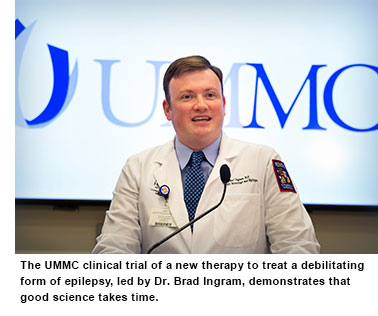Bad Blood is Bad Science
Good morning!
Recently between my comings and goings I got the opportunity to read the book “Bad Blood: Secrets and Lies in a Silicon Valley Startup,” written by John Carreyrou.
A national nonfiction bestseller, the book presents the fascinating story of how a bright and ambitious college dropout, Elizabeth Holmes, successfully convinced a lot of intelligent, wealthy and even famous people that she and her team of whiz kids had developed a breakthrough way of conducting extensive laboratory tests on just a few drops of blood. Her invention, a high-tech device about the size of a carry-on suitcase, could reputedly perform hundreds of lab tests, from the routine to the exotic, in a matter of minutes.
 Except it couldn’t. It never really worked. It was all smoke and mirrors. And the investors who bought into her dream and the company Holmes founded, Theranos, to the tune of $9 billion, lost everything. What seemed almost too good to be true was, in fact, just that.
Except it couldn’t. It never really worked. It was all smoke and mirrors. And the investors who bought into her dream and the company Holmes founded, Theranos, to the tune of $9 billion, lost everything. What seemed almost too good to be true was, in fact, just that.
Those of us who live in the world of scientific discovery, if only on the periphery, know that it is a slow, careful and deliberate process, with far more disappointments and dead ends than breakthroughs. Indeed, some of a scientist’s best days and most gratifying work provide just another brick in a very long road to deeper understanding of a disease process or an effective therapy. But without that brick, we’re going nowhere.
We all long for innovation that makes for faster and easier testing and a shortcut to miraculous cures for dread diseases. Genetic testing, precision medicine and editing of individual genes through technologies like CRISPR are dramatically changing the prospects for individually tailored medical therapies. These innovations, of course, were decades in the making, and each step forward must be taken with care to avoid harming our patients and thereby setting back our work. In the disciplined process of good science, there is no room for short cuts or sloppy work.
I’m proud of the direction that UMMC Research is headed in this regard. After building a national reputation in basic science, particularly in physiology through the work of Dr. Arthur Guyton and Dr. John Hall, and population science, based on the work of Dr. Herbert Langford and Dr. Dan Jones, we have made great strides in positioning ourselves for an exciting new era of translational and clinical research. Clinical quality, patient safety and scientific integrity are, and must be, at the heart of these efforts.
A few examples:
- Since November, we have been conducting a clinical trial on the safety and efficacy of CBD oil, an extract of marijuana, in 10 pediatric patients with a severe form of epilepsy that can cause them to experience hundreds of seizures a day. A unique formulation of the CBD oil is produced by the National Center for Natural Products Research located at Ole Miss. Based on early results, the Food and Drug Administration has granted the study’s principal investigator, Dr. Brad Ingram, a one-year extension of the trial. Even though this study took nearly three years to get off the ground, and required Brad and his collaborators to jump through every hoop imaginable, the assurance that we will “do no harm” to our patients through this novel therapy is non-negotiable.
- This summer we will open our $8 million Clinical Research and Trials Unit in University Hospital. Funded by the Mississippi Legislature, the 30-bed unit will allow us to conduct inpatient clinical research studies in a dedicated unit under the highest ethical and safety standards. Our collaboration with the Mayo Clinic, which has grown by leaps and bounds during the last four years, ensures that our protocols mirror Mayo’s protocols, and in fact, that Mayo-originated studies will be conducted here and UMMC-originated studies can be conducted on Mayo’s campuses.
- Finally, I’ll mention the SPRINT studies that have provided new guidelines for safely controlling hypertension. These are national population studies involving many institutions and thousands of patients in tightly controlled studies to distill the optimal approach to prevent early death and disability. Our own Dr. Jones, a national leader in these studies, and Dr. Marion Wofford, Dr. Zeb Henson and their colleagues, are part of these painstaking efforts to amass the best evidence on which to base clinical decisions that serve our patients’ interests.
In the end, good science takes time, along with careful and thoughtful deliberation. It takes collaboration with others, validation of findings and the highest level of integrity in all phases. I am proud of the scientific discovery effort here at UMMC, which has never been stronger or more diverse. From the bench to the bedside and every step in between, it is what sets us apart as an academic medical center and leads to cutting-edge care for our patients, on our journey to A Healthier Mississippi.



